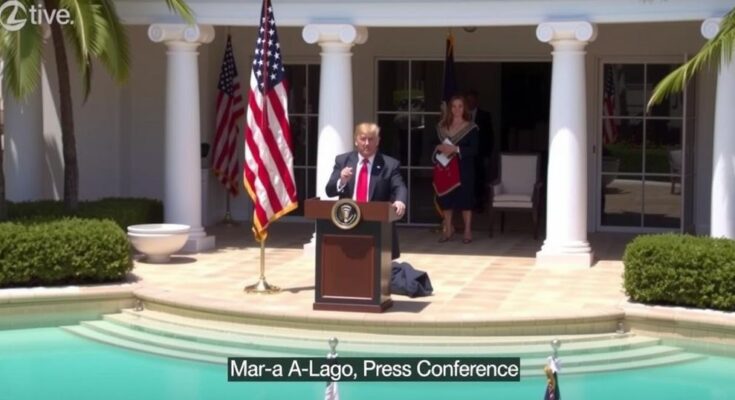In a recent press conference at Mar-a-Lago, President-elect Donald Trump outlined aggressive foreign policy intentions, hinting at military actions towards the Panama Canal and Greenland, while criticizing President Biden’s policies. His remarks suggest a shift from an isolationist stance to an imperialist agenda, alongside a commitment to reinstating former energy policies and involvement in Middle Eastern negotiations regarding hostages.
On the precipice of taking office, President-elect Donald Trump made a striking appearance at his Mar-a-Lago address, intensifying his assertions regarding American foreign policy. Asserting national security concerns, he hinted at the potential military takeover of both the Panama Canal and Greenland, which remains a Danish territory. Trump did not dismiss the idea outright, stating, “I’m not going to commit to that. It might be that you’ll have to do something. The Panama Canal is vital to our country.” This marked a significant shift from his previously espoused isolationist stance, illustrating an emerging imperialistic agenda.
Trump also made controversial remarks regarding Canada, suggesting economic coercion instead of military action for potential annexation purposes, claiming, “Why are we supporting a country $200 billion plus a year?” His rhetoric raised eyebrows, particularly as it began to include the idea of the United States imposing tariffs on its allies and requiring their adjustment to his vision of economic relations.
In addition to these international remarks, Trump declared his intention to counter President Joe Biden’s recent bans on offshore drilling, promising to reverse such decisions upon his inauguration. He asserted, “I will reverse it immediately. And we will drill, baby, drill.” This claim points to a broader skepticism about the Biden administration’s policies and an intention to restore his prior energy policies.
Further complicating matters, Trump highlighted the ongoing hostage situation in Gaza, expressing a need for a resolution prior to his inauguration and emphasizing his involvement. He posited a grim outlook should the situation remain unresolved, saying, “If this deal’s not done… all hell is going to break out.” This statement pressed an urgency on diplomatic amends in a volatile region.
While discussing former President Jimmy Carter, amid the somber occasion of laying him to rest, Trump did not shy away from criticism, declaring it “a disgrace what took place at the Panama Canal” under Carter’s watch. This departure from conventional respect for a deceased president’s legacy illustrates Trump’s distinctive approach to leadership and criticism, emphasizing fierce partisanship even in grief.
Lastly, Trump commented on energy policies targeting gas heating standards, countering Biden’s efficiency initiatives and expressing a preference for gas heat, framing it as more comfortable. He stated, “As the expression goes, you don’t itch. Does anybody have a heater where you go and you scratch an itch?” This statement encapsulates Trump’s rhetorical style, intertwining technical policy discussion with personal anecdotes.
Overall, Trump’s press conference revealed a blend of aggressive foreign policy posturing, economic confrontation against allies, and the continuation of his previous administration’s energy policies, all while intertwining personal attacks and backlash against contemporary leadership.
This article discusses President-elect Donald Trump’s press conference held at his Mar-a-Lago estate in Florida, just days before his inauguration. During this event, Trump laid out bold claims about U.S. foreign policy intentions, including potential military actions regarding strategically significant locations such as the Panama Canal and Greenland. Additionally, he criticized outgoing President Biden’s policies, particularly in areas like energy drilling and foreign relations, while asserting his involvement in negotiations regarding hostages in Gaza. Trump’s remarks reflect not only a continuation of his previous administration’s positions but also reveal his distinct approach to diplomacy and domestic policy as he prepares to assume office again.
In summary, President-elect Trump’s Mar-a-Lago press conference encapsulated his assertive stance ahead of his inauguration. The discussion of aggressive international policies, marked by potential military interventions, signals a shift towards a more confrontational U.S. foreign policy approach. Moreover, his criticisms of the Biden administration and commitment to reinstating prior policies on energy production illustrate a fervent determination to reshape America’s domestic and international landscape. Trump’s commentary and proposed directives evoke both support and controversy, setting the stage for a tumultuous return to power.
Original Source: www.mprnews.org




